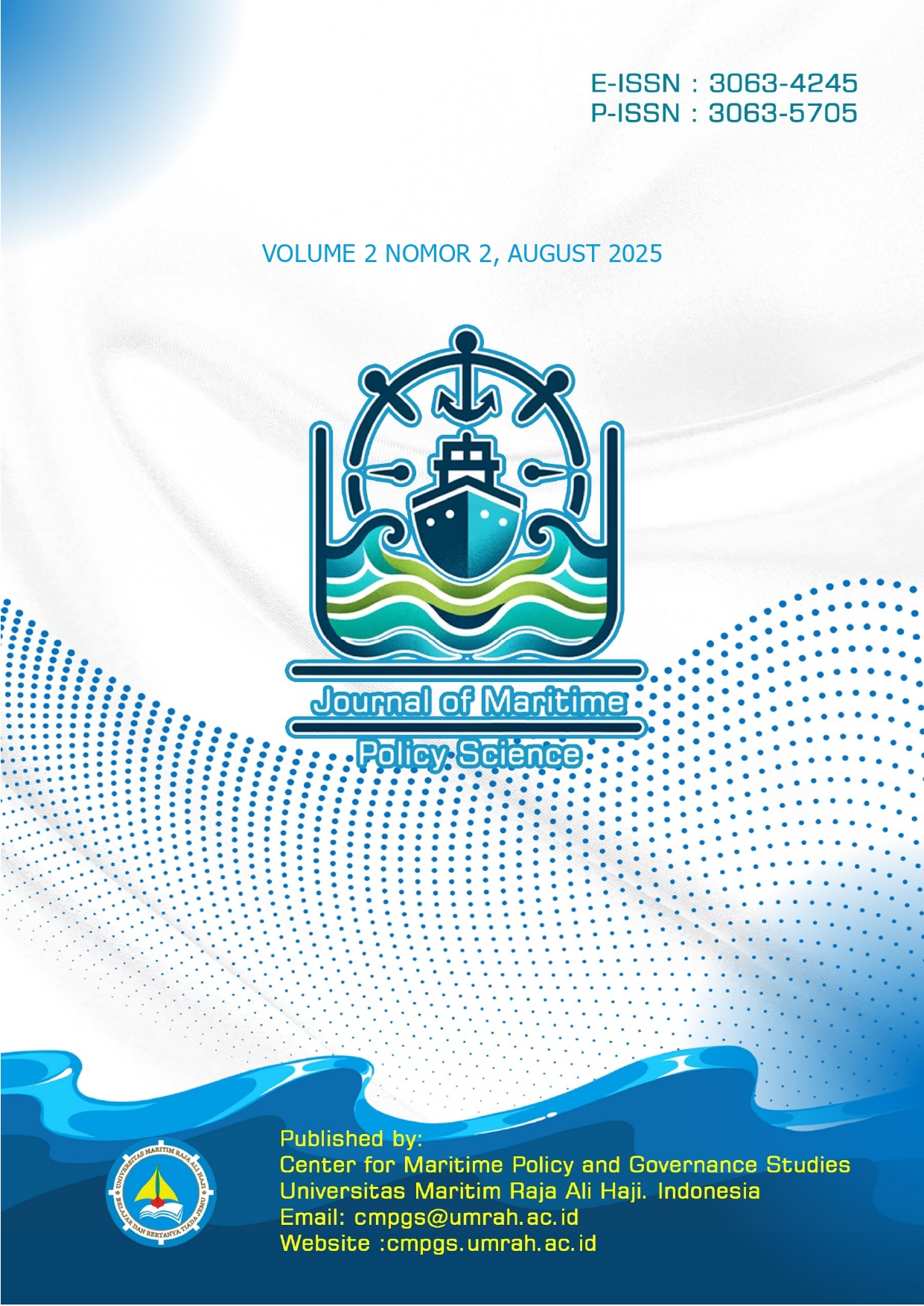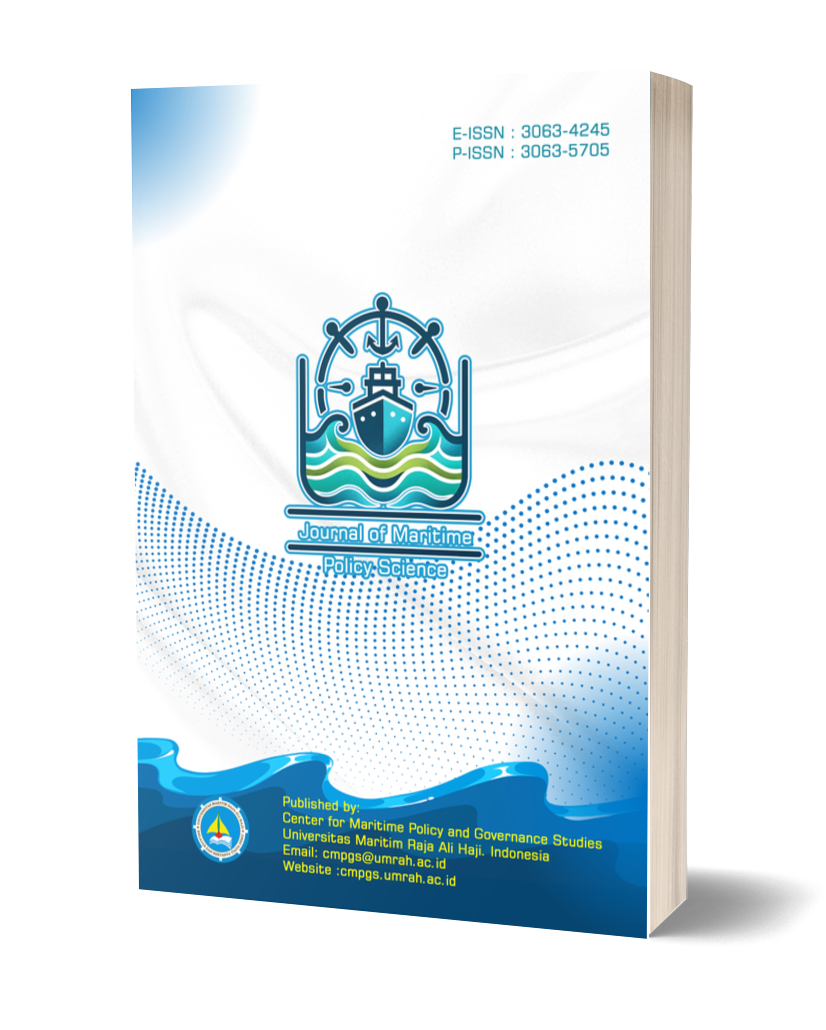Revitalization of Marine Culture Through Maritime Based Development Policy in Indonesia
DOI:
https://doi.org/10.31629/jmps.v2i2.7423Keywords:
Maritime Culture, Policy Implementation, Culture-Based DevelopmentAbstract
Indonesia, as the world’s largest archipelagic state, possesses a rich maritime heritage shaped by centuries of seafaring and coastal livelihoods. However, national development has long prioritized land-based sectors, marginalizing maritime culture within policy frameworks. This study aims to analyze how maritime-based development policies can serve as instruments for revitalizing maritime culture and to identify the challenges and opportunities for their implementation. Employing a descriptive qualitative approach, the research draws upon Edward III’s policy implementation theory to examine policy communication, resource adequacy, bureaucratic structure, and implementers’ disposition as determinants of success. Data were obtained through documentation studies, secondary data from government institutions, and semi-structured interviews with policymakers, cultural actors, and coastal community leaders. The findings reveal that while comprehensive legal instruments such as Law No. 5 of 2017 on Cultural Advancement and Presidential Regulation No. 16 of 2017 on Indonesian Marine Policy exist, implementation remains weak due to fragmented inter-agency coordination, limited resources, and insufficient political commitment. Some local innovations, such as culture-based marine schools and regional maritime heritage mapping, demonstrate potential best practices. The study concludes that revitalizing maritime culture requires integrating socio-cultural values into policy planning, strengthening institutional capacity, and involving coastal communities as key actors. Such efforts are essential to transform maritime culture from a symbolic narrative into a substantive foundation for sustainable and inclusive national development.
Downloads
References
Akindele, E. O., Oladeji, T. A., Kowobari, E. D., Adedapo, A. M., Fagbohun, I. R., Akinpelu, O. T., & Oyeku, O. G. (2023). Gold mining impairs the biological water quality of a culturally important river and UNESCO World Heritage Site in Nigeria. Environmental Pollution, 326, 121470. https://doi.org/10.1016/J.ENVPOL.2023.121470
Creswell, J. W., & Creswell, J. D. (2018). Research design. Qualitative, quantitative, and mixed methods approaches (5th ed.). SAGE Publications.
Fabinyi, M., Belton, B., Dressler, W. H., Knudsen, M., Adhuri, D. S., Abdul Aziz, A., Akber, M. A., Kittitornkool, J., Kongkaew, C., Marschke, M., Pido, M., Stacey, N., Steenbergen, D. J., & Vandergeest, P. (2022). Coastal transitions: Small-scale fisheries, livelihoods, and maritime zone developments in Southeast Asia. Journal of Rural Studies, 91, 184–194. https://doi.org/10.1016/J.JRURSTUD.2022.02.006
Fung, A., & Wright, E. O. (2001). Deepening democracy: Innovations in empowered participatory governance. Politics and Society, 29(1), 5–41. https://doi.org/10.1177/0032329201029001002/ASSET/AD0730BC-47FE-45FD-9D7B-5A0BC989092E/ASSETS/0032329201029001002.FP.PNG
Guo, Z. H. (2022). Local Revitalization: Support from Local Residents. Sustainability, 14(14), 8298. https://doi.org/10.3390/SU14148298
Hoshino, E., Hillary, R., Davies, C., Satria, F., Sadiyah, L., Ernawati, T., & Proctor, C. (2020). Development of pilot empirical harvest strategies for tropical tuna in Indonesian archipelagic waters: Case studies of skipjack and yellowfin tuna. Fisheries Research, 227, 105539. https://doi.org/10.1016/J.FISHRES.2020.105539
Jun, K. N., & Musso, J. (2013). Participatory Governance and the Spatial Representation of Neighborhood Issues. Urban Affairs Review, 49(1), 71–110. https://doi.org/10.1177/1078087412453704
Kismartini, K., Roziqin, A., & Authori, N. (2023). A stakeholder analysis for sustainable development of Maritime Village in Semarang coastal community, Indonesia. Public Administration and Policy, 26(3), 321–334. https://doi.org/10.1108/PAP-10-2022-0119
Lapuz, M. C. M. (2023). The role of local community empowerment in the digital transformation of rural tourism development in the Philippines. Technology in Society, 74, 102308. https://doi.org/10.1016/J.TECHSOC.2023.102308
Manullang, A. J. (2024). Unraveling the Maintenance of Southeast Asia’s Maritime Security: A Look into the ASEAN Maritime Outlook. Journal of Maritime Policy Science, 1(1), 40–48. https://doi.org/10.31629/JMPS.V1I1.6878
Margaretha, R., Syuzairi, M., & Mahadiansar, M. (2024). Digital Transformation in the Maritime Industry; Opportunities and Challenges for Indonesia. Journal of Maritime Policy Science, 1(1), 1–10. https://doi.org/10.31629/JMPS.V1I1.6872
Marliani, M. (2024). Enhancing Maritime Security: Challenges and Strategies in Indonesia’s Natuna Sea. Journal of Maritime Policy Science, 1(1), 32–39. https://doi.org/10.31629/JMPS.V1I1.6876
Mujiburohman, D. A., & Andari, D. W. T. (2023). Revitalization of Rawa Pening lake, Indonesia. Environment Conservation Journal, 24(2), 83–90. https://doi.org/10.36953/ECJ.14112421
Pratson, L. F. (2023). Assessing impacts to maritime shipping from marine chokepoint closures. Communications in Transportation Research, 3, 100083. https://doi.org/10.1016/J.COMMTR.2022.100083
Prescott, J. R. V. ., & Schofield, C. H. . (2005). The maritime political boundaries of the world . BRILL.
Rauch, J. E., & Evans, P. B. (2000). Bureaucratic structure and bureaucratic performance in less developed countries. Journal of Public Economics, 75(1), 49–71. https://doi.org/10.1016/S0047-2727(99)00044-4
Samin, R., Akhyary, E., Kurnianingsih, F., & Puspitaningtyas, Z. (2024). Policy and governance of maritime resources in the Riau Islands Province. Australian Journal of Maritime and Ocean Affairs, 1–14. https://doi.org/10.1080/18366503.2024.2356363
Scheyvens, R. (1999). Ecotourism and the empowerment of local communities. Tourism Management, 20(2), 245–249. https://doi.org/10.1016/S0261-5177(98)00069-7
Vinata, R. T., Kumala, M. T., & Yustisia Serfiyani, C. (2023). Climate change and reconstruction of Indonesia’s geographic basepoints: Reconfiguration of baselines and Indonesian Archipelagic Sea lanes. Marine Policy, 148, 105443. https://doi.org/10.1016/J.MARPOL.2022.105443
Yin, Z. Y., Huang, A. M., & Huang, Z. Y. (2024). Virtual tourism attributes in cultural heritage: Benefits and values. Tourism Management Perspectives, 53. https://doi.org/10.1016/j.tmp.2024.101275
Zamorano, M. M., & Rodríguez Morató, A. (2015). The cultural paradiplomacy of Barcelona since the 1980s: understanding transformations in local cultural paradiplomacy. International Journal of Cultural Policy, 21(5), 554–576. https://doi.org/10.1080/10286632.2014.943752
Downloads
Published
Issue
Section
License
Copyright (c) 2025 Ummil Khalish, Febriansyah Febriansyah (Author)

This work is licensed under a Creative Commons Attribution-ShareAlike 4.0 International License.
You are free to:
- Share — copy and redistribute the material in any medium or format for any purpose, even commercially.
- Adapt — remix, transform, and build upon the material for any purpose, even commercially.
- The licensor cannot revoke these freedoms as long as you follow the license terms.
Under the following terms:
- Attribution — You must give appropriate credit, provide a link to the license, and indicate if changes were made . You may do so in any reasonable manner, but not in any way that suggests the licensor endorses you or your use.
- ShareAlike — If you remix, transform, or build upon the material, you must distribute your contributions under the same license as the original.
- No additional restrictions — You may not apply legal terms or technological measures that legally restrict others from doing anything the license permits.















